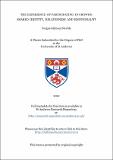Files in this item
The experience of participating in crowds : shared identity, relatedness and emotionality
Item metadata
| dc.contributor.advisor | Reicher, Stephen | |
| dc.contributor.author | Neville, Fergus Gilmour | |
| dc.coverage.spatial | 386 | en_US |
| dc.date.accessioned | 2012-09-20T20:47:23Z | |
| dc.date.available | 2012-09-20T20:47:23Z | |
| dc.date.issued | 2012-06-19 | |
| dc.identifier.uri | https://hdl.handle.net/10023/3112 | |
| dc.description.abstract | The aim of this thesis is to extend the social identity model of crowd behaviour (Reicher, 1984, 1987, 1996) by exploring the experience of collective participation, with an emphasis upon quality of within-crowd social relations (‘relatedness’) and collective emotionality. A multi-method research strategy is employed to study these topics at a variety of crowd events. Studies 1 and 2 use ethnography and retrospective interviews at a student protest and public screenings of football matches to generate hypotheses for subsequent testing. Study 3 then tests these hypotheses by means of questionnaire data collected during Study 2. Using an experimental ‘visualisation’ paradigm, Study 4 demonstrates the role of shared identity (and not simply self-categorization) in generating relatedness. Studies 5 and 6 present evidence that groups of high relatedness participants experience identity-relevant stimuli as more emotionally intense than low relatedness groups. Study 7 concludes the empirical work by using questionnaire data collected at political protests to test a model of collective experience based upon the findings of the previous studies. The thesis argues that a perception of shared identity with co-present others can positively transform social relations towards relatedness (connectedness, validation and recognition). Relatedness may then be experienced emotionally, and facilitate the realisation of group goals which may also have emotional consequences. Strength of social identity is also noted as an antecedent to group-based emotion. In this way the analysis offers three ways in which social identity may lead to emotionality of collective experience, contradicting ‘classic’ crowd psychology in which crowd emotion was rooted in a loss of identity. Preliminary evidence is also presented suggesting that the experience of collective participation may have a role to play in determining future social identification and participation in co-action. | en_US |
| dc.language.iso | en | en_US |
| dc.publisher | University of St Andrews | |
| dc.subject | Crowd | en_US |
| dc.subject | Collective action | en_US |
| dc.subject | Emotion | en_US |
| dc.subject | Identity | en_US |
| dc.subject.lcc | HM753.N4 | |
| dc.subject.lcsh | Group identity | en_US |
| dc.subject.lcsh | Crowds | en_US |
| dc.subject.lcsh | Collective behavior | en_US |
| dc.subject.lcsh | Emotions | en_US |
| dc.title | The experience of participating in crowds : shared identity, relatedness and emotionality | en_US |
| dc.type | Thesis | en_US |
| dc.contributor.sponsor | Economic and Social Research Council (ESRC) | en_US |
| dc.type.qualificationlevel | Doctoral | en_US |
| dc.type.qualificationname | PhD Doctor of Philosophy | en_US |
| dc.publisher.institution | The University of St Andrews | en_US |
This item appears in the following Collection(s)
Items in the St Andrews Research Repository are protected by copyright, with all rights reserved, unless otherwise indicated.

